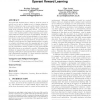Free Online Productivity Tools
i2Speak
i2Symbol
i2OCR
iTex2Img
iWeb2Print
iWeb2Shot
i2Type
iPdf2Split
iPdf2Merge
i2Bopomofo
i2Arabic
i2Style
i2Image
i2PDF
iLatex2Rtf
Sci2ools
GECCO
2009
Springer
2009
Springer
Novelty of behaviour as a basis for the neuro-evolution of operant reward learning
An agent that deviates from a usual or previous course of action can be said to display novel or varying behaviour. Novelty of behaviour can be seen as the result of real or apparent randomness in decision making, which prevents an agent from repeating exactly past choices. In this paper, novelty of behaviour is considered as an evolutionary precursor of the exploring skill in reward learning, and conservative behaviour as the precursor of exploitation. Novelty of behaviour in neural control is hypothesised to be an important factor in the neuro-evolution of operant reward learning. Agents capable of varying behaviour, as opposed to conservative, when exposed to reward stimuli appear to acquire on a faster evolutionary scale the meaning and use of such reward information. The hypothesis is validated by comparing the performance during evolution in two environments that either favour or are neutral to novelty. Following these findings, we suggest that neuro-evolution of operant reward...
| Added | 24 Jul 2010 |
| Updated | 24 Jul 2010 |
| Type | Conference |
| Year | 2009 |
| Where | GECCO |
| Authors | Andrea Soltoggio, Ben Jones |
Comments (0)

